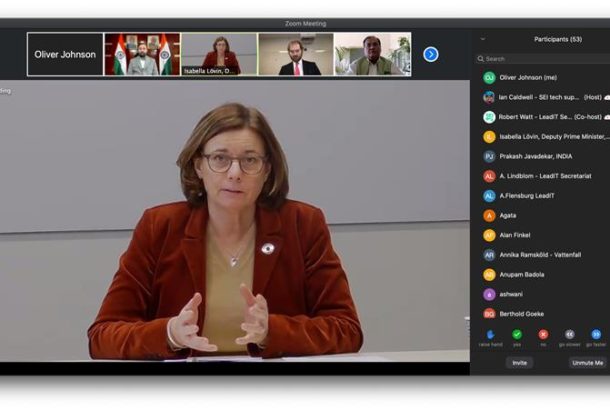Countries and companies commit to urgent action to transform heavy industry.
Ahead of the fifth anniversary of the Paris Agreement, governments and CEOs of major international companies committed themselves to urgent and collective action to radically reduce emissions from heavy industries. They re-affirmed their commitment to accelerating the industry transition and to building back better from the COVID-19 pandemic.
At the first Leadership Summit for Industry Transition, the governments of Australia, Denmark, France, Germany, India, Luxembourg, Netherlands, Sweden and UK joined together with CEOs of major international companies to commit to making the business case for industry transition, and implement mechanisms to rapidly diffuse climate technologies and know-how.
The Summit participants, who are all LeadIT members, called for increased collaboration and collective action to create new markets and jobs, shift financial flows to low-greenhouse gas emissions, catalyse demand and harness sustainable value chains for the industry transition.
The Summit Statement pledges to create stable and reliable markets for green industrial products, specifically by exploring – before COP26 – pathways and partnerships to promote sustainable, green procurement. In addition, the Summit identified charging infrastructure to support electrification of heavy goods transport, and coherent policy on carbon capture as important areas for joint action.
Read the Summit Statement
Leadership Summit Statement (PDF)
"We are determined to take concerted global action to enable a transformation of heavy industry," said Isabella Lövin, Sweden's Environment Minister and Deputy Prime Minister, at the Leadership Summit.
“Together we are determined to take concerted global action to enable a transformation of heavy industry. We are at an historic cross road and we must seize this opportunity to tackle the climate crisis and build back better after the COVID-19 pandemic,” said Isabella Lövin, Swedish Minister for Environment and Climate and Deputiy Prime Minister of Sweden.
“Indian companies are committed to mitigating climate change and are responsible partners that are already taking voluntary action to reduce emissions. But in order to accelerate the industry transition and bring it to scale, we need technology. We need research collaboration and a sharing of know-how, but most of all we need affordable technologies in order to facilitate the efforts of developing countries efforts to transform their industry sector,” said Shri Prakash Javadekar, Indian Minister of Environment, Forest and Climate Change.
At the Industry Transition Leadership Summit stated that several Indian industries have started taking measures to reduce carbon emissions without any diktat. We have to encourage these voluntary contributions towards achieving our transition targets.#IndiaLeadsClimateAction pic.twitter.com/L377tS6HJk
— Prakash Javadekar (Modi Ka Parivar) (@PrakashJavdekar) December 1, 2020
“The urgency of stimulating markets for low carbon industrial products, that is the urgency of stimulating demand, has been given far too little attention. Governments working in partnerships with industry can play an important role in kickstarting this demand. Most directly as significant buyers of industrial products, for example in construction and defense. We as governments can be the first customers of low carbon industrial products, setting the standard and forging the way for others to follow,” said Kwasi Kwarteng, the United Kingdom’s Minister for Business, Energy and Clean Growth.
“What we can provide are technology solutions to bringing down emissions in cement production. We can prove that we can reduce up to 40% percent of CO2 emissions in cement production by replacing limestone with clay. But what is needed for us and our customers is that governments around the world engage in green public procurement and that they use green cement for government infrastructure projects. That would allow us to get into volume production with these green products and make them more affordable for our customers”, said Thomas Schulz, CEO of FLSmidth.
“On the question of how we can create demand for low-carbon industrial products, I can say that we at Scania need fossil-free steel. A truck we produce weighs six and a half tons, five and a half tons of which are steel. At the same time as we have a demand for fossil-free steel, other industry sectors have a demand for sustainable transport. That is a demand we at Scania can meet. So if we start looking across industry sectors, we can create chains of demand that will allow us to move away from pilot projects and on to real business to truly start transforming industry,” said Henrik Henriksen, CEO of Scania.
“I am requesting policymakers to look at specific sectors where we can work together to stimulate demand for green products with the help of policy interventions, and make this world a better place,” said SP Shukla of Mahindra Group.
“Youth believe that decarbonizing heavy industry is an urgent task. There is a need for stakeholders to work together and build coalitions with young people who bring in both creative and critical thinking and are thus able to contribute to the solutions needed to accelerate the transition,” said Helen Watts, Director of Innovation and Partnerships at Student Energy.
